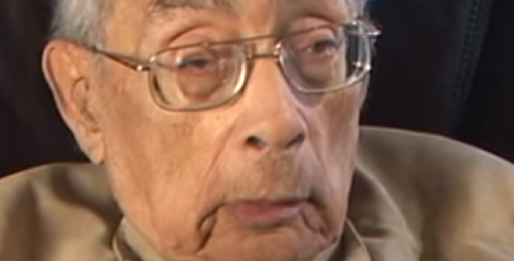Simeon Booker. Image-YouTube
This is how the journalist Simeon Booker described an account of the Civil Rights Movement: “Glaring down at us from the truck were five white men, armed to the teeth with shotguns … All five sprang from the truck and surrounded the car. ‘Get out,’ the huskiest one snapped. ‘Who are you niggers and where are you going?’ I couldn’t think of anything but the truth so I told them, ‘We’re reporters down here to cover the [Emmett Till] murder trial. We took the wrong road and got lost.’ ‘You niggers have no business around here,’ he sneered. ‘You’re just stirring up trouble.’ Directing us to keep our hands above our heads, they frisked both of us then searched the car … After what seemed like a lifetime, the ‘hunters’ were satisfied with having scared the hell out of us and having ended their search ordered us to ‘get the hell out’ of there.”
For many decades, including during my years as Mayor of New Orleans, Jet magazine ran a column of happenings from around the country, called Ticker Tape. I was honored that my work often attracted the notice of the columnist, Washington Bureau Chief Simeon Booker. Memorably, it was through Booker’s column that my engagement to my wife, Michelle Miller, was announced to the nation.
Booker, by then, was a civil rights legend, having chronicled far more momentous events. We join the nation in mourning his passing at the age of 99.
In person, Simeon Booker appeared the epitome of a bookish wordsmith, with his heavy eyeglass frames and natty bowtie. But his mild-mannered looks belied his ferocity as a journalist and a civil rights warrior.
He gained fame as “the man from Jet” during his coverage of Emmett Till’s murder, funeral and his murderers’ trial. His description of Emmett’s mother, Mamie Till-Mobley, at the funeral became instantly iconic: “Her face wet with tears, she leaned over the body, just removed from a rubber bag in a Chicago funeral home, and cried out, ‘Darling, you have not died in vain. Your life has been sacrificed for something.'”
Perhaps more than any other journalist of his time, Booker most comprehensively chronicled the impact of the Urban League Movement on civil rights and racial equality in the nation. He covered President Dwight D. Eisenhower’s historic 1958 meeting with the “Big Four” civil rights leaders, Rev. Martin Luther King., Jr., of the Southern Christian Leadership Conference, A. Phillip Randolph of the Brotherhood of Sleeping Car Porters, Roy Wilkins of the NAACP, and my predecessor as head of the National Urban League, Lester Granger. He rode a bus with the Freedom Riders in 1961. He covered not only President John F. Kennedy’s 1962 summit with the “Big Six” – having expanded to include the leaders of the Congress of Racial Equality and the National Council of Negro Women – but also the frustration that followed and led to the 1963 March on Washington.
To create a realistic picture of the economic status of Blacks in 1960 for the 5th anniversary edition of Jet’s sister publication, Ebony, Booker relied on the National Urban League’s research “to tell black audiences what they already suspected: that the masses of Negro citizens were actually farther removed, relatively speaking, from the mainstream of American life than they were twenty years earlier.”
Before he found his own office space in Washington, Booker often worked out of the Greater Washington Urban League – and even hired away a staffer, E. Fannie Granton, as his first employee when he opened Jet’s Washington Bureau.
In his autobiography, Shocking the Conscience, A Reporter’s Account of the Civil Rights Movement, Brooker wrote about the tragic death of National Urban League Executive Director Whitney M. Young, who drowned in Nigeria in 1971. A friend, Brigadier General Daniel “Chappie” James, then the highest ranking Black officer in the Air Force, tearfully confirmed the news.
“He’s my hero,” he choked. “He’s my kind of guy because he gets in there and proves what a black cat can do – with his head instead of a brick.” Chappie could probably write a list as long as both of his massive arms of the people who might not be where they were in their careers if it weren’t for the work of the Urban League, whose focus was jobs, jobs, jobs. While other civil rights organizations hammered away at school desegregation, voting rights and public accommodations – all of which were important – the Urban League had its own niche – and it was economics – the economics of having a job, and after that a better job, until a lback man or woman reached his or her fullest potential.
We are grateful now, as then, for Booker’s clear-eyed and fearless reporting. At a time when reckless accusations of “fake news” threaten to undermine the vital role of the Fourth Estate, we should honor his legacy by defending freedom of the press.
Marc H. Morial, President and CEO
National Urban League






